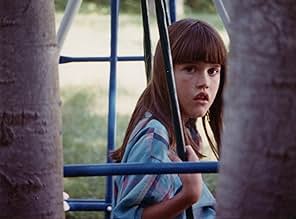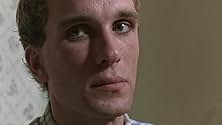VALUTAZIONE IMDb
7,0/10
6311
LA TUA VALUTAZIONE
Un padre schizofrenico, appena uscito da un istituto psichiatrico, lotta per riavere l'affidamento della figlia dai genitori adottivi.Un padre schizofrenico, appena uscito da un istituto psichiatrico, lotta per riavere l'affidamento della figlia dai genitori adottivi.Un padre schizofrenico, appena uscito da un istituto psichiatrico, lotta per riavere l'affidamento della figlia dai genitori adottivi.
- Regia
- Sceneggiatura
- Star
- Premi
- 5 vittorie e 6 candidature totali
Recensioni in evidenza
This is a small indie by Lodge Kerrigan made in 94. Kerrigan's recent film Keane was astonishing (as was Damian Lewis). Like Keane, this film features a genuinely real and captivating performance by an actor playing a schizophrenic. The film's movement is fragmentary, roped together by a soundtrack that reveals the voices we might suppose are echoing within our character's unbound mind. His actions are confusing to him, and make us increasingly reluctant to watch, as watching makes us complicit with what he does, which is bad.
The use of sound in this film practically makes it worth watching in its own right, pun intended. In the critic's video essay that accompanies the Criterion release of this film, which is pitched to grad level film students (and that's not a complaint), Michael Atkinson remarks that the director uses "objective" sound, not "subjective" sound. It's true that the sounds that fill the film's soundtrack are given us from the external world, often through the protagonist's car radio and sometimes simply through the ether. But I'd disagree with Atkinson. I don't think this is just use of objective sound to a parallel the film's fragmented and "subject-less" subject and narrative. Yes, it's a different use of sound, but it's a complication of subjective sound, not a departure from it. After all we hear the soundtrack, and therefore we can't but believe that the subject hears them.
The use of sound here is interesting, I think, because the protagonist is not hearing them but producing them. We're given the sounds as he hears them, but they echo and resound within his schizophrenic mind, as they are the schizophrenic's world. Voices unattributed, perhaps real, perhaps recollected, but certainly not sounds that anchor the schizophrenic to reality. Rather, sounds that divorce him from the world, catching him as abruptly as an unexpected blow to the head. Short, sharp, shocks that knock about and bring into consciousness commands, put-downs, and other forms of verbal punishment that trouble us for their detachment. We don't know who's saying them. Which means we don't know why they are being said, which means (as Atkinson notes), we don't know what to think of them.
Where Atkinson hangs these sounds on a reel of film though, my sense is that they should be hung on memory, which is not a reel of film, is certainly subjective, if not multiply subjective, and is not objective in the slightest for the simple reason that memories can't be. Our schizophrenic protagonist's relation to sound is that he's caught in a compulsive listening, but cannot hear. The coup in Kerrigan's sonic genius, I think, is that in memory is the protagonist's pain, and it's a pain he suffers, often, without making the slightest of sound. But for the one that we hear.
The use of sound in this film practically makes it worth watching in its own right, pun intended. In the critic's video essay that accompanies the Criterion release of this film, which is pitched to grad level film students (and that's not a complaint), Michael Atkinson remarks that the director uses "objective" sound, not "subjective" sound. It's true that the sounds that fill the film's soundtrack are given us from the external world, often through the protagonist's car radio and sometimes simply through the ether. But I'd disagree with Atkinson. I don't think this is just use of objective sound to a parallel the film's fragmented and "subject-less" subject and narrative. Yes, it's a different use of sound, but it's a complication of subjective sound, not a departure from it. After all we hear the soundtrack, and therefore we can't but believe that the subject hears them.
The use of sound here is interesting, I think, because the protagonist is not hearing them but producing them. We're given the sounds as he hears them, but they echo and resound within his schizophrenic mind, as they are the schizophrenic's world. Voices unattributed, perhaps real, perhaps recollected, but certainly not sounds that anchor the schizophrenic to reality. Rather, sounds that divorce him from the world, catching him as abruptly as an unexpected blow to the head. Short, sharp, shocks that knock about and bring into consciousness commands, put-downs, and other forms of verbal punishment that trouble us for their detachment. We don't know who's saying them. Which means we don't know why they are being said, which means (as Atkinson notes), we don't know what to think of them.
Where Atkinson hangs these sounds on a reel of film though, my sense is that they should be hung on memory, which is not a reel of film, is certainly subjective, if not multiply subjective, and is not objective in the slightest for the simple reason that memories can't be. Our schizophrenic protagonist's relation to sound is that he's caught in a compulsive listening, but cannot hear. The coup in Kerrigan's sonic genius, I think, is that in memory is the protagonist's pain, and it's a pain he suffers, often, without making the slightest of sound. But for the one that we hear.
sorry, this isn't a Hollywood movie about schizophrenia, its not a killer/thriller, its not a gross~out picture, and its not boring. Not being schizophrenic myself i can't attest to the strict accuracy of the impression one is left with. All I can say for sure is that this is without question one of the most strangely beautiful, compassionate, powerful pieces of art i have ever seen.
The story is ultimately incredibly frustrating and deeply tragic, much like the life of its protagonist; poignant and scary start to finish. the cinematography captures the absurd beauty of the natural world and juxtaposes it with the terrifying strangeness of feeling utterly disconnected therefrom. Peter suffers from random auditory hallucinations, so we do to. He is deeply paranoid and almost utterly lost in the world; its clear someone is out to get him, and we are never sure whether he actually hurt anyone or not.
If you want to be spoon~fed something you've already experienced many times before, this isn't the movie for you. But if you appreciate being challenged, forced even, to see the world through a very different lens, you should really see this movie if you haven't already.
The story is ultimately incredibly frustrating and deeply tragic, much like the life of its protagonist; poignant and scary start to finish. the cinematography captures the absurd beauty of the natural world and juxtaposes it with the terrifying strangeness of feeling utterly disconnected therefrom. Peter suffers from random auditory hallucinations, so we do to. He is deeply paranoid and almost utterly lost in the world; its clear someone is out to get him, and we are never sure whether he actually hurt anyone or not.
If you want to be spoon~fed something you've already experienced many times before, this isn't the movie for you. But if you appreciate being challenged, forced even, to see the world through a very different lens, you should really see this movie if you haven't already.
Forget "A Beautiful Mind". This film has a true and simple soul. "Clean, Shaven" is a powerful and insightful look into the world of the paranoid. That it is a low budget "indie" only adds to it's effect. Hollyweird has lost it's ability to produce quality films like this one. It is an "Ox Bow Incident" for the schizophrenics of the world. From the sound effects to Peter Greene's seamless performance, this film never ceases to amaze me. That people stop watching after the first five minutes only proves the point the film is trying to make. He acts "weird" so he must be a deranged killer or a predatory pedophile. It's an indictment of the ever present "Burn them at the stake" mentality. Two thumbs up ...
Peter Winter is a young schizophrenic who is desperately trying to get his daughter back from her adoptive family. He attempts to function in a world that, for him, is filled with strange voices, electrical noise, disconcerting images, and jarringly sudden emotional shifts.
I do not believe this is a very well-known film. I say this because despite it being released by the prestigious Criterion Collection, it was not a title I was familiar with. And I like to think I know movies. (maybe this is naiveté.) Although this went under the radar, I think it deserves a look by anyone who is interested in mental illness, especially as depicted on film. This is not sappy, or starring Sean Penn, or anything we might expect from Hollywood. this is a serious attempt to show the problems the mentally ill face... and it does not leave room for too much happiness.
I do not believe this is a very well-known film. I say this because despite it being released by the prestigious Criterion Collection, it was not a title I was familiar with. And I like to think I know movies. (maybe this is naiveté.) Although this went under the radar, I think it deserves a look by anyone who is interested in mental illness, especially as depicted on film. This is not sappy, or starring Sean Penn, or anything we might expect from Hollywood. this is a serious attempt to show the problems the mentally ill face... and it does not leave room for too much happiness.
one of my alltime-favorites!! I´ve seen it years ago and it still haunts me. this is what real film-making is about, this is how it is supposed to be. lodge kerrigan is a true master, and it´s a pity he hasn´t done anything in years, except CLAIRE DOLAN which is true genius as well. peter "zed" greene gives a landmark performance and it seems that he suffers the same fate like malcolm mcdowell after CLOCKWORK ORANGE: being one of the best but underrated actors of his time but without a second chance to prove it.
anyway, if you wanna "feel" - not just see - what mental illness is all about, check this out.
anyway, if you wanna "feel" - not just see - what mental illness is all about, check this out.
Lo sapevi?
- QuizPeter Greene's first line comes eighteen minutes into the movie.
- BlooperThe steering column shifter knob in Peter's car is missing. Then it reappears.
- Citazioni
Peter Winter: I was in a, in a hospital bed, and I had been operated on. And they had put a, a small receiver in the back of my head and a transmitter in my finger. You know what they are?
Nicole Winter: A radio?
Peter Winter: Yeah, a radio. Anyway, to get at the transmitter, I had to take my fingernail off.
I più visti
Accedi per valutare e creare un elenco di titoli salvati per ottenere consigli personalizzati
- How long is Clean, Shaven?Powered by Alexa
Dettagli
Botteghino
- Budget
- 68.000 USD (previsto)
- Lordo Stati Uniti e Canada
- 26.351 USD
- Lordo in tutto il mondo
- 26.351 USD
Contribuisci a questa pagina
Suggerisci una modifica o aggiungi i contenuti mancanti




























